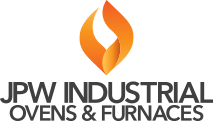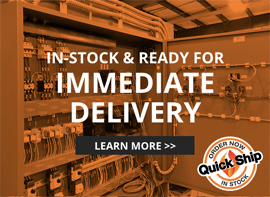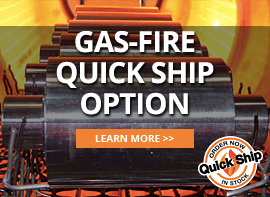Manufacturing processes across countless industries depend on precise, controlled heating to transform raw materials into finished products. Industrial ovens serve as the foundation of these operations, providing consistent thermal processing that modern production demands. Understanding how these specialized systems work and their diverse applications can help you select the right equipment to optimize your manufacturing processes.
What Are Industrial Ovens?
An industrial oven is a heated chamber designed for various manufacturing applications, including drying, curing, baking, and heat-treating components, parts, or final products. Unlike standard commercial ovens, these systems are engineered to handle demanding industrial requirements, featuring precise temperature control, uniform heat distribution, and robust construction designed for continuous operation.
These ovens operate across multiple industries, including aerospace, automotive, chemical processing, electronics manufacturing, and pharmaceuticals. They provide the controlled environment necessary for critical manufacturing processes that require exact temperature specifications and consistent results.
Key Applications Across Industries
- Electronics Manufacturing
Electronic components require careful moisture removal to prevent damage during assembly and operation. Industrial drying ovens eliminate moisture from circuit boards, semiconductors, and other sensitive electronic parts, ensuring optimal performance and longevity. The controlled environment prevents contamination while achieving the precise drying conditions necessary for reliable electronic components. - Automotive and Aerospace Industries
Heat-treating and curing processes are critical for automotive and aerospace components that must withstand extreme conditions. Industrial ovens provide the controlled heating necessary for strengthening metals, curing composite materials, and applying protective coatings. These applications demand precise temperature control and uniform heat distribution to ensure component integrity and safety standards. - Chemical Processing
Chemical reactions often require precise temperature control to achieve desired outcomes and maintain safety standards. Industrial ovens facilitate these processes by maintaining consistent heating conditions for chemical synthesis, powder coating, curing, and material testing. The controlled environment ensures reproducible results and maintains the safety protocols essential in chemical manufacturing.
Types of Industrial Ovens
Choosing the right type of industrial oven depends on your specific application requirements, production volume, time constraints, and processing needs.
- Batch Ovens
Batch ovens, including cabinet ovens and walk-in ovens, represent the most versatile category of industrial heating equipment. These systems process materials in discrete batches, making them ideal for small to medium production runs, multiple product types, and applications requiring different temperature profiles. They excel at curing, drying, aging, and annealing processes where flexibility is paramount. - Conveyor Ovens
Conveyor ovens combine the benefits of continuous processing with flexible product handling, offering a seamless workflow. The integrated conveyor system transports products through the heating chamber, providing consistent processing times, reduced labor requirements, and scalable production capacity. These systems offer excellent control over processing speed and exposure time to temperature. - Cleanroom Ovens
Cleanroom ovens meet stringent contamination control requirements for sensitive industries such as pharmaceuticals and electronics manufacturing. These specialized systems feature HEPA filtration systems, position pressure environments, stainless steel construction, and validation documentation for regulatory compliance. They maintain the pristine conditions necessary for applications that are sensitive to contamination.
How Industrial Ovens Work
Industrial ovens operate on the principle of thermal conduction, transferring heat energy to products through controlled heating processes. The heat generation methods vary based on application requirements and efficiency considerations.
Most industrial ovens use gas, electricity, steam, or thermal fluids to generate heat. The product to be processed is placed inside the oven chamber, and the door is closed to maintain consistent temperature conditions. The temperature inside the oven is then raised to the desired level, causing the material or product inside to heat up.
The controlled heat application triggers specific chemical and physical reactions in the product, whether it is drying, curing, or heat-treating. Advanced control systems monitor and maintain precise temperature conditions throughout the process, ensuring consistent results and optimal product quality.
Temperature Control and Monitoring
Modern industrial ovens feature sophisticated control systems that maintain specific temperature profiles throughout the processing cycle. Key features include digital temperature controllers, multiple temperature zones, data logging capabilities, alarm systems for temperature deviations, and integration with facility management systems.
These advanced controls provide consistent processing conditions, enable remote monitoring for operational efficiency, and allow documentation for quality control.
Maximizing Your Investment
Industrial ovens represent significant investments that directly impact production efficiency and product quality. Choosing the right equipment requires careful planning and consideration of your current needs and future growth plans. JPW Industrial Ovens & Furnaces provides comprehensive solutions for a wide range of heating applications. Our custom-designed systems deliver precise temperature control, uniform heating, and reliable performance across various industries. Whether you require high-temperature processing or cleanroom compatibility, JPW’s expertise delivers the ideal equipment tailored to your specific needs. Contact us today to discuss how our heating solutions can optimize your manufacturing processes and provide the reliable performance for your operations’ demands.


